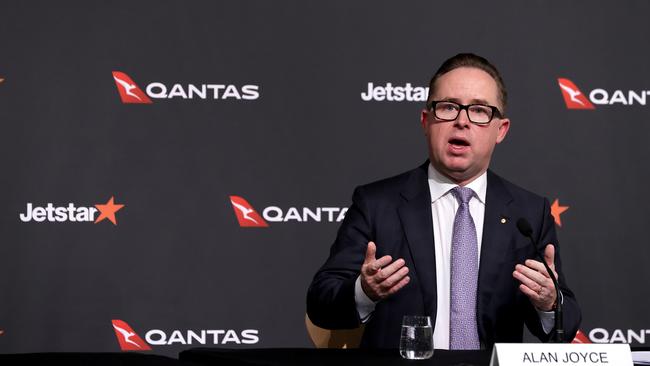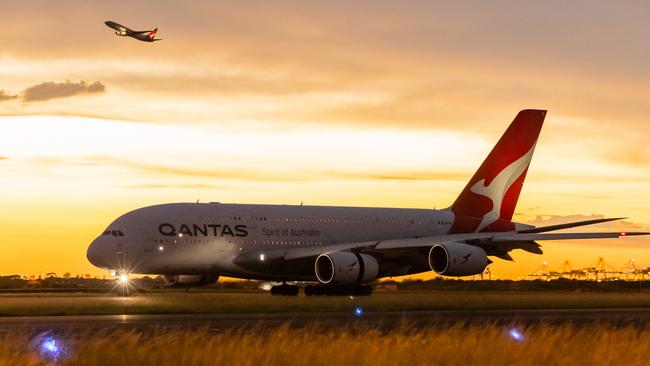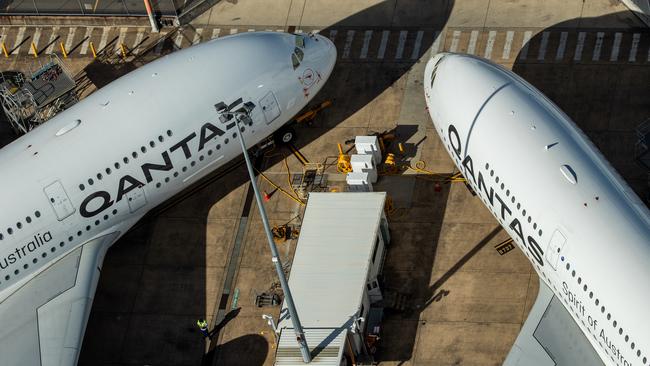
Ukraine is a million miles away from the day-to-day operations of hauling passengers around Australia but the stress it is putting on global oil markets represents the latest serious threat to the aviation industry.
In a normal year, fuel represents one of the top two costs for Qantas, usually sitting just behind staff wages. As the airline starts ramping up operations and with the prospect of a sustained conflict around Ukraine, fuel could emerge as the single biggest expense line, particularly as oil passes the six-year threshold of $US100 a barrel.
Qantas has long been known for hedging its fuel costs – a practice that locks in future prices. While other airlines including in the US or China have generally moved away from this given the high expenses that generally come with it, smoothing out wild swings in prices can offer a major safety net when hedges work in your favour.

With 90 per cent of Qantas’s fuel bill hedged until June 2022, the current program is well in the money. The airline is assuming an average oil price of $US86.61 per barrel for the second half of this calendar year which could see this revised up closer to June.
It has the lever to manage this through ticket prices and with an expected 70 per cent domestic market share once all border restrictions are lifted, it is likely that consumers this time around will be paying the difference.
It will be tougher on the fuel-hungry long haul international business, where pricing on tickets remains more competitive.
Even with a recapitalised Virgin Australia and the smaller threats of Regional Express and upstart entrant Bonza, Joyce maintains Qantas is flying for margin, not market share; he’s even said as much to outgoing ACCC chairman Rod Sims. Still, this didn’t stop Jetstar selling 22,000 promotional tickets this week for $22 each.
“We’re going to be flying for cash. We’re going to be generating revenue in the air … If we can earn a dollar in the air it’s better than to lose it on the ground,” says Joyce. This could be the airline’s position for years.
Qantas is a business that has taken some serious Covid blows. It’s been forced into space of aggressive reinvention when there was no runway left, while each new wave of Covid represents losses that run into the hundreds of millions.
On Thursday Joyce unveiled his fourth consecutive half-year loss for Qantas – an underlying loss before tax of $1.28bn, and a statutory loss before tax of $622m, for the six months to end-December. The latest result came about as staff were reinstated and then the Omicron wave hit late last year. Essentially the airline was again paying wages when little to no revenue was coming through the door. Total headline losses since the start of Covid run to more than $6bn, sunk by a $22bn revenue hole.
Turbulence ahead
In the face of extreme pressure for the past over the past two years, Qantas has taken on an extraordinary amount of debt. Today both secured and unsecured loans are running at just under $7bn compared with $4.6bn pre-Covid. However this is softened by the $2.7bn cash pile it is sitting on. Still, this will be spent quickly as operations ramp up.
Debt strains
Despite signs of a stabilising environment, Qantas is not fully in the clear. It has net assets of just $15m – yes $15m – even before taking into account some $3.6bn in accumulated losses sitting on its balance sheet. Minnow rival Regional Express has net assets of $173.4m, which shows how quickly Qantas needs to bulk up.
The airline is targeting $1bn of annualised cost savings by next financial year; nearly 60 per cent of these savings have come from staff cuts and other exits. It is also looking at additional measures to ensure the $1bn in savings isn’t eroded by broader inflation across the economy.
Ironically, after cutting nearly 10,000 roles over the past two years, staffing is becoming a critical issue for Qantas as the airline prepares to grow again.
In particular, white collar workers and non-airline staff are becoming increasingly hard to come by. Technology workers, HR, management and legal specialists have been lured away to other companies following two years of wage freezes and the uncertainty of working in a sector that has been fighting for survival.

“It’s been a tough few years and now retention is an issue,” Joyce says.
To counter this Qantas is offering up to $5000 worth of shares on current prices to 20,000 staff on the condition they stay until August next year and the key milestones on the cost savings program are met. Here Qantas is increasingly finding itself competing against others from BHP to Woolworths to fill specialist roles.
“We do have a risky period – a period we need to get through in the next couple of years to make sure we don’t lose any further skills from the organisation,” Joyce says.
More than any other chief executive, he knows that the Covid environment can change dramatically at any minute. In September last year, as he was presenting his full year results, the Qantas boss was talking of a recovery from Covid’s Delta strain, anticipating a strong Christmas and saying by March this year the domestic market would be running at near full capacity.
He was talking at a time when no states had hit the 70 per cent population target for double vaccinations and travel was severely restricted with the international border and most state borders closed. Then at the start of December Joyce was talking about 100 per cent of pre-Covid capacity by February. It is currently around the mid-60 per cent mark.
“It’s been a rollercoaster of expectations,” Joyce says.
However, he maintains the fundamentals of a recovery remain in place – a highly vaccinated population, Omicron receding. Markets and borders are opening up around the world and now there is certainty for the first time on all the domestic borders staying open. This time Qantas is tipping 90-100 per cent of pre-Covid capacity by the June quarter.
“We’re seeing demand come in better than we did last year as we built it up before Delta hit. We’re ahead in the corporate market, we’re ahead in the SME market, we’re massively ahead in leisure and people are planning their holiday trips in Easter so the outlook is looking a lot stronger.”
The 100 per cent capacity mark in the domestic market is important because it enables the airline to generate an extraordinary amount of cash, helping it to quickly pay down debt faster and manage the oil bumps.
johnstone@theaustralian.com.au





Just as Alan Joyce thought Qantas was flying out of the Covid storm, a new one is taking its place.